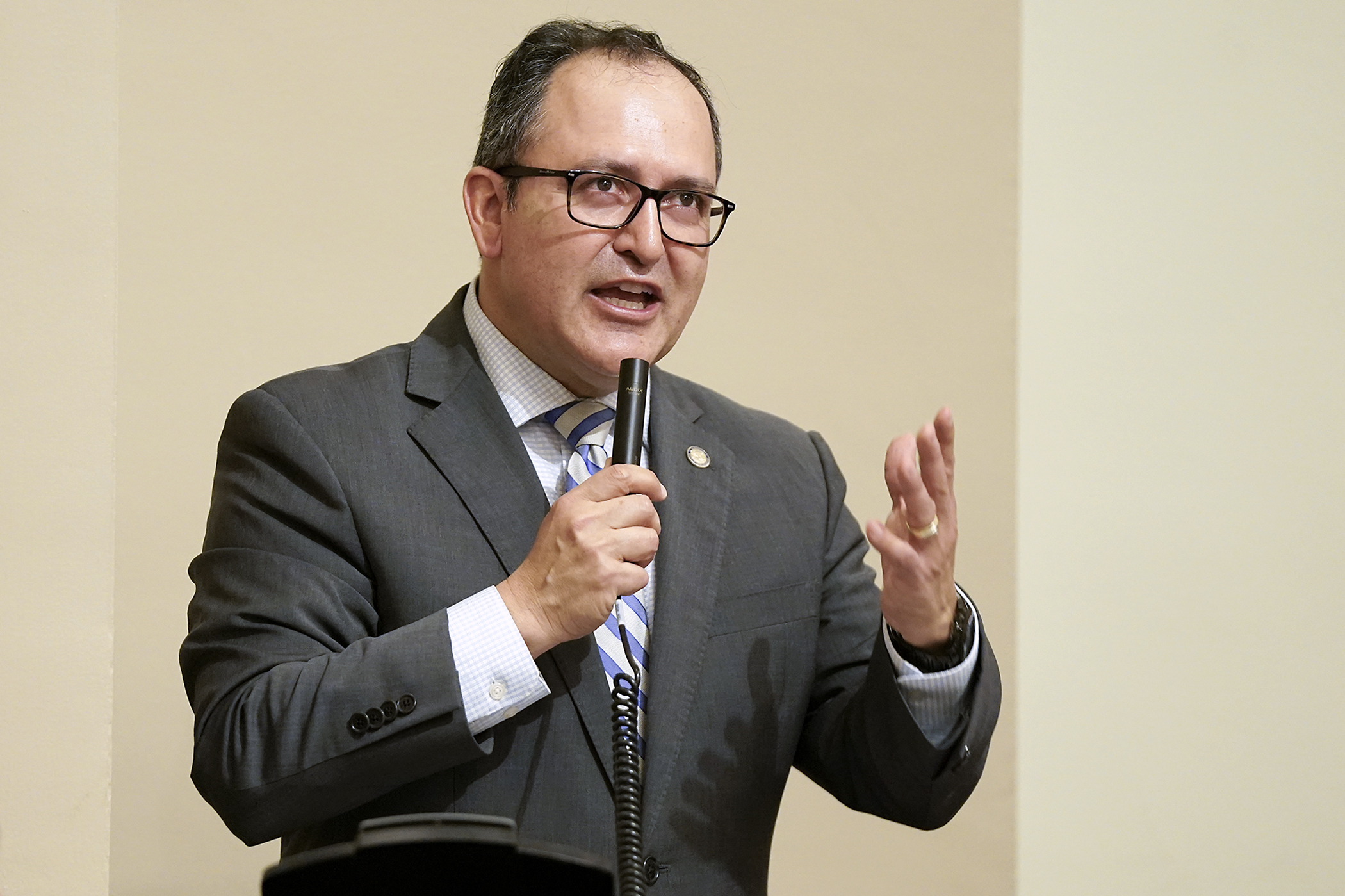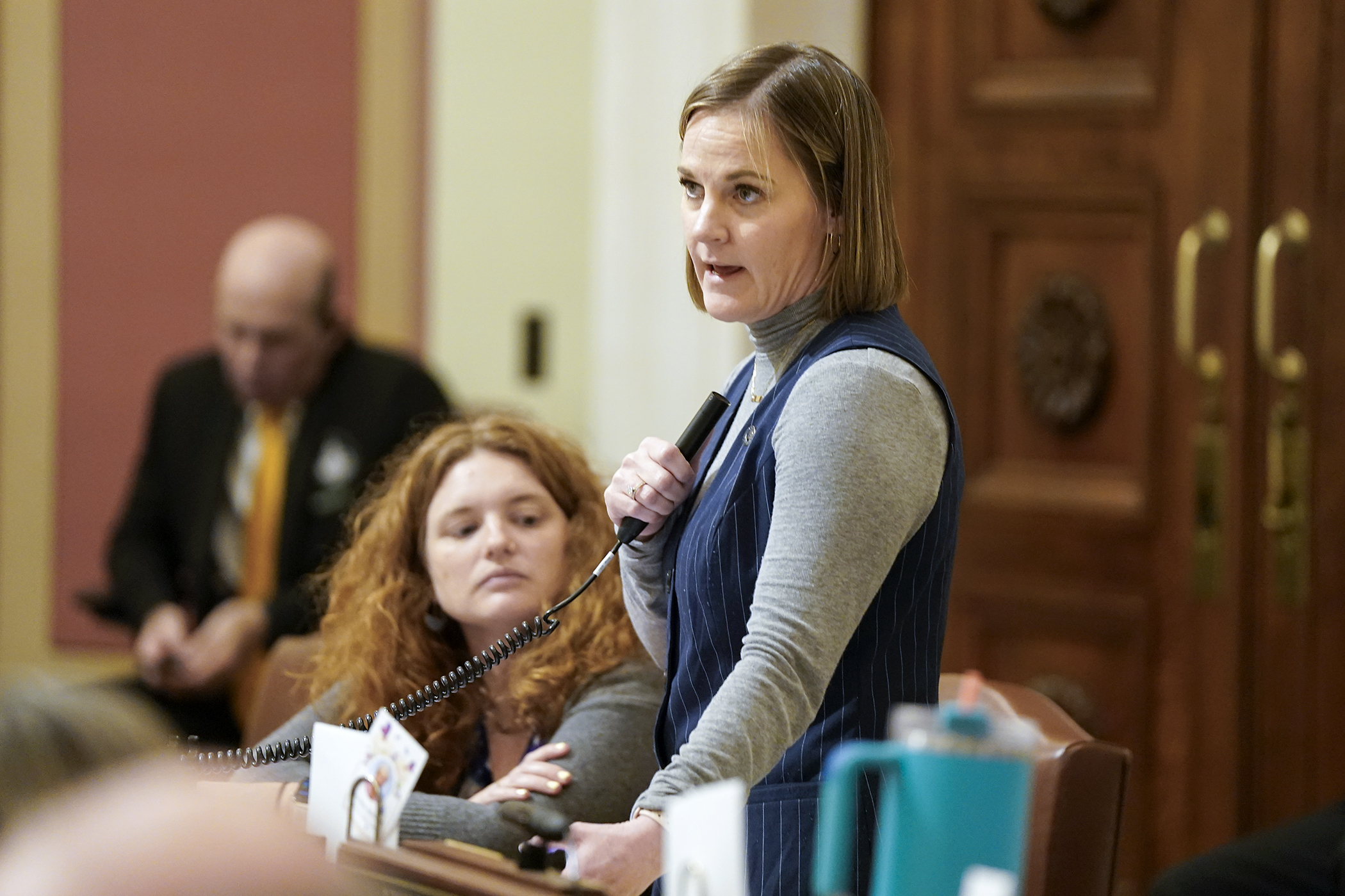House passes transportation finance bill with increased road funding, transit cuts

More money for roads, bridges and resilient pavement and less for mass transit: Those are among the upshots of the omnibus transportation finance and policy bill, which was passed by the House, as amended, 85-49 Monday afternoon and sent to the Senate.
Sponsored by Rep. Jon Koznick (R-Lakeville), HF2438 contains $476.57 million in General Fund spending for the 2026-27 biennium, but met its budget target of no net increases in General Fund transportation spending.
“This is a balanced bill,” Koznick said. “This makes our transportation smarter, safer and more sustainable, both environmentally and fiscally. And it prioritizes the modes of transportation that Minnesotans use most.
“We’re pulling the plug on some failed projects. And it’s a bipartisan bill that includes about 16 GOP provisions, 14 DFL and most of the governor’s provisions.”
While transportation showed up on the House Budget Resolution as having a General Fund target of zero, the committee is entrusted with making recommendations on how several funds should be disbursed, including the Trunk Highway Fund, County State-Aid Highway Fund, Municipal State-Aid Street Fund, State Airports Fund, and Highway User Tax Distribution Fund.
Where the money’s going
Here are HF2438’s largest proposed transportation funding increases for the 2026-27 biennium:
- Blatnik Bridge (Duluth), $650 million;
- state road construction, $454.09 million;
- resilient pavement program, $50 million;
- Interstate 35W and County State Aid Highway 50 interchange (Lakeville), $40.8 million;
- Corridors of Commerce, $30 million;
- transportation economic development, $30 million;
- state roads operations and maintenance, $22.86 million;
- state roads program delivery, $16.32 million;
- transportation project activity portal, $12.7 million; and
- State Patrol recruitment and hiring initiatives, $11.41 million.
And here are the bill’s largest proposed reductions in transportation funding for the next biennium:
- Metropolitan Council transit system operations, $40 million;
- Greater Minnesota transit, $12 million;
- Office of Traffic Safety Drug Program, $6 million;
- General Fund transfer to active transportation, $4 million;
- Advisory Council on Public Safety, $2 million; and
- Transfer into the General Fund from the Metropolitan Council, $1.83 million.
[MORE: View the transportation budget tracking sheet]
Policy changes
Among proposed changes to state policy found in the bill are:
- making online drivers’ license renewals possible;
- adding driving 35 mph over the speed limit to the reasons for license revocation;
- creating an Empowering Small Minnesota Communities program;
- making changes to the transportation impact assessment and mitigation account;
- raising the surcharge on all-electric vehicles;
- extending temporary vehicle permits for nonresident buyers to 60 days;
- new requirements for applicants for dealer licenses;
- changes in requirements upon unpaid insurance vehicle claims;
- changing seat belt requirements for all-terrain vehicles;
- increasing examination fees if someone fails to appear for a scheduled road test;
- establishing a transportation project activity portal; and
- creating a resilient pavement program.
[MORE: House committee gives green light after omnibus transportation bill travels bumpy road]
Proposed amendments
One successful amendment would alter the size and source of a grant for suicide prevention at Minneapolis’ Washington Avenue Bridge.
Three other amendments were unsuccessful. They would have lowered the proposed $200 all-electric vehicle surcharge to $100, eliminated the bill’s delays to greenhouse gas emissions measurement, and increased the appropriation for Greater Minnesota transit.
During the floor debate, the strongest objections to the bill concerned its delay in implementing measurement of greenhouse gas emissions from transportation.
 Rep. Erin Koegel, co-chair of the House Transportation Finance and Policy Committee, highlights various provisions in the omnibus transportation budget bill during an April 28 floor session. (Photo by Michele Jokinen)
Rep. Erin Koegel, co-chair of the House Transportation Finance and Policy Committee, highlights various provisions in the omnibus transportation budget bill during an April 28 floor session. (Photo by Michele Jokinen)“Climate change is real,” said Rep. Lucy Rehm (DFL-Chanhassen). “We can’t afford to go back, and we can’t afford to wait.”
Support for the bill ranged from enthusiastic to tepid.
“We are funding our planes, our trains, our automobiles and our buses in this bill, and we’re even talking about electronic bicycles,” said Rep. Bjorn Olson (R-Fairmont).
“I think that this bill is not quite as balanced as we’d like to think, because I think a lot of it is in the past and not looking toward the future,” said Rep. Erin Koegel (DFL-Spring Lake Park), the co-chair of the House Transportation Finance and Policy Committee, who nevertheless voted in favor of the bill.
Related Articles
Search Session Daily
Advanced Search OptionsPriority Dailies
Speaker Emerita Melissa Hortman, husband killed in attack
By HPIS Staff House Speaker Emerita Melissa Hortman (DFL-Brooklyn Park) and her husband, Mark, were fatally shot in their home early Saturday morning.
Gov. Tim Walz announced the news dur...
House Speaker Emerita Melissa Hortman (DFL-Brooklyn Park) and her husband, Mark, were fatally shot in their home early Saturday morning.
Gov. Tim Walz announced the news dur...
Lawmakers deliver budget bills to governor's desk in one-day special session
By Mike Cook About that talk of needing all 21 hours left in a legislative day to complete a special session?
House members were more than up to the challenge Monday. Beginning at 10 a.m...
About that talk of needing all 21 hours left in a legislative day to complete a special session?
House members were more than up to the challenge Monday. Beginning at 10 a.m...